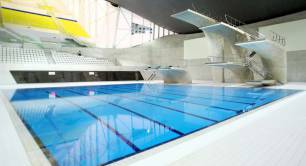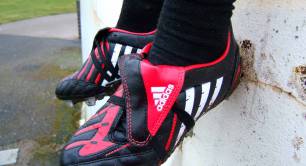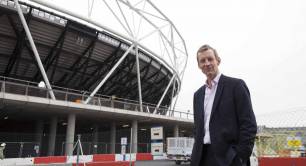Move over hipsters! Bikeworks takes cycling up a gear
Increasingly your bike is a statement of allegiance, be it to the Lycra crew or London's trendiest cyclists. But London based social enterprise, Bikeworks, is all about inclusivity. That's why they're generating a £1m plus turnover each year as they strive to help people into employment, make cycling accessible to all and save bikes from the UK's overloaded landfill sites.
Jim Blakemore, a club promoter turned social entrepreneur, was up against it when I rang to talk about the nuts and bolts of his social enterprise, Bikeworks. I sat on the line for a short while, listening to the busy chatter of a dynamic business in full swing. This was not going to be a story of creaking wheels and rusty chains.
Blakemore’s early morning task had been to wrestle over the phone with a security guard at the Olympic Park so that his team could get in to run a disability cycling class. One of the more “minor challenges”, he tells me, involved in running a social business.
Blakemore is co-director and joint founder of Bikeworks, a London-based social enterprise, which uses bikes as tools to create social and environmental change at community level. He started the business in 2006 with his partner Zoe Portlock, who is now chair. Dave Miller, who was running a similar start-up at the time, joined forces with the start-up, and now runs the business as a co-director.
Bikeworks grew out of a dissertation that Portlock wrote during a social enterprise degree at the University of East London. It was a business plan for a bike enterprise that would prolong the Olympic legacy, and create change in local communities. Blakemore ran a bike hire business in Cambridge at the time, and was able to help Portlock build the plan. The dissertation sparked his “aha moment.”
Before the bike scene beckoned, Blakemore spent his early career DJing and promoting club nights across England, squeezing in time to teach people with learning disabilities to DJ in his free time. Through Portlock's research he discovered how to bring the two strands of busines and social purpose together. He sold his shares in his bike hire business, and he set about with Portlock and Miller to make the imaginary cycling social enterprise a reality.
We want to be the bike shop that isn’t this sort of slightly aloof and slightly arrogant and condescending environment that a lot of bike shops are...
The social enterprise now has three retail shops, a bike servicing unit in the basement of Deloitte, three training centres and two disability clubs. Visit a Bikeworks shop and you’ll find top of the range bike parts and mechanics offering repair services as well as refurbished bikes saved from landfill and recycled bike parts, which are also sold on its Online Vintage Bikes and Parts Shop.
Bikeworks works towards two key social purposes at its centres across London. It engages people with physical and learning disabilities in cycling, and provides training to get people back into employment, equipping them with mechanical and customer service based skills.
But there is another element to the Bikeworks’ theory of change. Cycling is not traditionally a community based sport like football. Showcased at grand events like the Olympics and the Tour de France, it has grown up with elite credentials and an aura of exclusivity. Increasingly, your bike is a statement of allegiance, whether you’re a young professional whizzing around the city on a bespoke Brompton, an East London hipster on a fixie with no brakes, or a Lycra-bound pro.
The overarching goal of Bikeworks is to break down those barriers, counter cycling’s inflated ego, and use the thrill of the ride for good. “Fundamentally through the whole organisation we’re about offering a very welcoming experience from the get go,” says Blakemore.
"If someone engages with us on one of our employability programmes regardless of how long they’ve been unemployed, regardless of what their background is we will treat them as an equal and make sure their learning experience is a good one.
On our consumer facing side we want to be the bike shop that isn’t this sort of slightly aloof and slightly arrogant and condescending environment that a lot of bike shops are.”
It’s proving a successful model so far. Bikeworks generated a turnover of £1.5m this year and a small profit. “We’re growing year on year,” Blakemore tells me. And this is down to rigorous income planning. The business generates 80% of its own revenue and only 20% of funds come through sponsorship.
All of the team put in above and beyond their 37 hours a week...
The business is set up as a Community Interest Company to allow for this mix of independent revenue and grants. “We felt that it gave us the freedom to income generate and the ability to go for grant funding should we need to,” says Blakemore. At the same time social purpose is effectively locked in with the condition that the majority of capital be used to fulfil the company's social purpose. Only 35% of profits can be freely distributed.
Retail is Bikeworks’ biggest earner, making up for 50% to 60% turnover. Local authority contracts to provide cycle training can be a big win for the business ranging from £50K to £100K. But it “fluctuates,” says Blakemore. Bikeworks also has a strong business-to-business operation, providing on site maintenance to News International, mobile mechanic services and selling team-building services to corporate businesses.
The business prides itself on an extremely low staff turnover. In order to invest in social impact, Bikeworks spends first and foremost on the team, Blakemore tells me. Staff costs are 78% of Bikeworks’ turnover. “That’s high for a business,” Blakemore concedes. “But what we do involves people putting time into other people.”
“All of the team put in above and beyond their 37 hours a week,” Blakemore says. “They love it and enjoy it because they can see the beneficiaries on a daily basis on their journey engaging with Bikeworks.”
There’s not yet any spend on social impact measurement. But Bikeworks is currently reviewing systems to capture more data, articulate and present its impact case to local authority commissioners.
I still think there is a disconnect between these Olympic professional and elitist disciplines and the local community
As the conversation draws to the close we get talking about the future and it turns out that Blakemore’s early morning chat with an Olympic Park security guard was indeed one hurdle in a much larger project. Bikeworks is on the brink of securing a new space opposite the Olympic velodrome, in Chobham Manor, the first of five neighbourhoods to be created at London’s Queen Elizabeth Olympic Park.
Blakemore's plan is to create an inclusive cycling centre of excellence, and expand its social purpose from supporting people who are unemployed or have learning and physical disabilities, to improving health and wellbeing in the UK. Blakemore envisages a centre that will “bring in health and wellbeing referrals, work with people with mental health, obesity and cardiovascular issues, and people with learning and physical disabilities.”
There are also plans to create a new training space. Its aim will be to attract young people from the Olympic boroughs and beyond to take maintenance classes, learn about the different disciplines of cycling and then experience cycling in the velodrome.
“I still think there is a disconnect between these Olympic professional and elitist disciplines and the local community” says Blakemore.
“We’re about breaking the barriers down, we’re developing avenues to progress people into the industry but we’re very much about getting into the nitty-gritty of the community”
Pioneers Post Business School content is delivered in partnership with Inspire2Enterprise. Inspire2Enterprise provide a unique, free-to-access social enterprise support, information and advice service – from start-up through to initial growth and beyond. Call them on 0844 9800 760 or visit www.inspire2enterprise.org to find out more.



